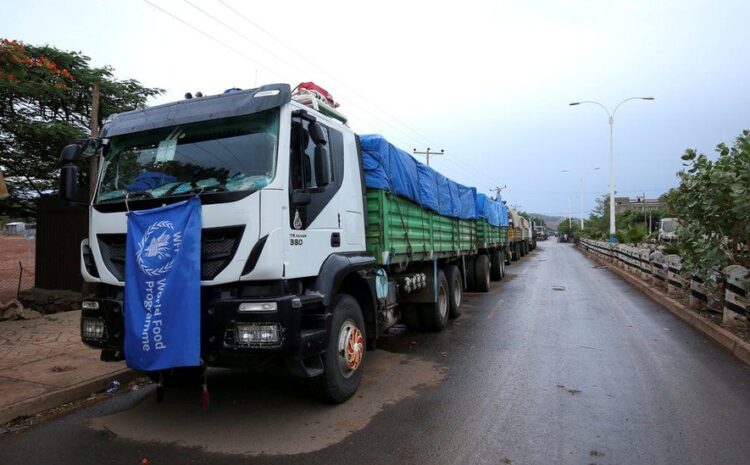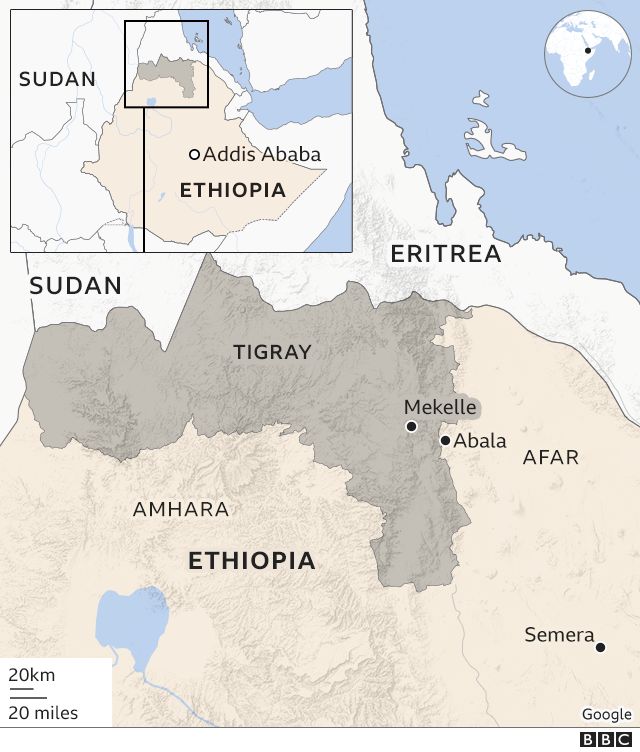
IMAGE SOURCE, REUTERS Image caption, WFP lorries in Ethiopia have been having difficulty reaching Tigray
The United Nations says that 72 drivers contracted to deliver humanitarian aid have been arrested in the war-torn north of Ethiopia.
It said that the drivers, who were working for the World Food Programme (WFP), were detained in Semera, capital of the Afar region.
The UN is speaking to the government to establish why they were stopped.
The war in Ethiopia has caused a massive humanitarian crisis, with more than five million in need of aid.
- REALITY CHECK: Why food aid isn’t reaching Tigray
- BBC AFRICA LIVE: Updates from the continent
The city of Semera is a staging post for aid lorries trying to reach the neighbouring region of Tigray, where the conflict flared up last year and where the UN says 400,000 people are living in “famine-like conditions”.
Hundreds of lorries are believed to be stuck in the city, prevented from taking the only viable overland route into Tigray.

There was no immediate comment on the arrests from the Ethiopian authorities.
On Tuesday, the UN said 16 members of its local staff and their dependents In the Ethiopian capital, Addis Ababa, had been arrested in raids. Six others were released.
The UN has urged the government to release the detainees immediately.
Lawyers and rights groups say the authorities targeted ethnic Tigrayan employees. The government denies arbitrarily arresting Tigrayans.
Spearheaded by the Tigray People’s Liberation Front (TPLF), rebel forces have been advancing towards Addis Ababa. They have been joined by another rebel group, the Oromo Liberation Army (OLA).
In response the government has declared a state of emergency, calling on citizens to register their weapons and get ready to protect their neighbourhoods.
In another development, Kenyan telecommunications giant Safaricom told the BBC that its foreign staff in Ethiopia had been evacuated and its local employees were required to work from home to ensure their safety.
It said the current political and security situation represented a risk to its investments in the country and that events would inform its future business decisions.
The ferocity of the conflict in the north has been brought out in reports by international non-governmental human rights organisations about sexual violence.
Amnesty International accuses TPLF fighters of raping, robbing and assaulting women after taking control of a town in the Amhara region in August.
Sixteen survivors from the attack at Nifas Mewcha were interviewed by Amnesty.
Ethiopia, with its population of more than 100 million, has been portrayed as a beacon of stability for the Horn of Africa, and is the African base for many international organisations.
In a statement last week, the UN Security Council called for an end to fighting, and reiterated support for African Union mediation efforts.
- EXPLAINER: Ethiopia’s Tigray war – and how it erupted
- VOICES: How to end Ethiopia’s suffering after a year of war
- FACT CHECK: Why food aid isn’t reaching Tigray
- VIEWPOINT: Why Tigray is starving, but no famine declared
